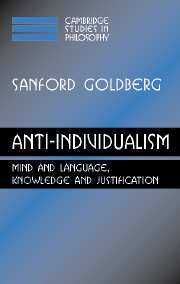Introduction
Published online by Cambridge University Press: 22 September 2009
Summary
INTRODUCTION
Linguistic communication is a pervasive feature of human life. Some of this communication involves the transmission of a piece of knowledge from speaker to hearer. In this book I argue that a proper account of the sort of communication that aims at the transmission of knowledge will have substantial implications for both the philosophy of mind and language, and for epistemology.
The burden of Part I (chapters 1–4) is to provide a novel argument for anti-individualism about mind and language. According to such views, the psychological properties instantiated by a subject, as well as the semantic (meaning) properties of her words, depend for their individuation on features of her social and natural environment. These views are quite popular, owing in large part to the seminal work of Tyler Burge and Hilary Putnam. Here I offer a novel argument for such views. Standardly, anti-individualistic views in the philosophy of mind and language are taken to be supported by considerations such as the semantics of speech- and attitude-reports, subjects' incomplete grasp of their own concepts, speakers' semantic deference to (some subset of) speakers in their linguistic community, the possibility of non-standard theorizing, or the objectivity of perceptual representations. My argument, by contrast, depends on none of these considerations.
- Type
- Chapter
- Information
- Anti-IndividualismMind and Language, Knowledge and Justification, pp. 1 - 8Publisher: Cambridge University PressPrint publication year: 2007



